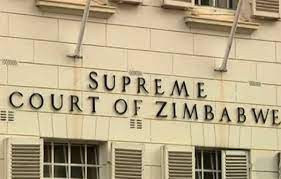
A Supreme Court bench has reinstated five members of the Zimbabwe National Army (ZNA) who were fired from work for allegedly stealing food rations.
The bench consisting of Justices Samuel Kudya, Joseph Musakwa and Susan Mavangira reinstated the five without loss of salaries.
The Supreme Court heard the matter after the army commander approached the court challenging a High Court judgment reinstating the five soldiers.
The commander had cited the soldiers Collen Chiba, Charles Mhuri, Bothwell Gorekore, Democracy Murambaroro, Gibson Madzinga and the Defence ministry as respondents.
However, the Supreme Court bench ruled in favour of the soldiers.
“A determination that is premised on the violation of a statute is void and of no legal effect,” the judges ruled.
“The respondents were neither provided with the record of proceedings nor the reasons upon which the decision was made.”
The officers were dismissed despite being acquitted by the Court Martial.
- Kenya's top court to rule on disputed presidential election
- More details emerge in Justice Gwaunza saga
- Opinion: Corruption a threat to viability of health systems
- Malunga farm case raises dust
Keep Reading
“They could not, therefore, impugn the correctness of the decision by appealing it,” the judges said.
“Rather, they were aggrieved by the decision-making process, which entailed seeking a review.”
The judges said the action of the army boss constituted a gross irregularity.
“Where a dismissal is set aside as being a nullity, the employee is reinstated as such notwithstanding the further disciplinary proceedings that the court may order by way of remittal or otherwise.
“The respondents have generally succeeded. They are entitled to their costs of appeal, on the ordinary scale.”
According to court records, on August 17, 2017 the respondents were prosecuted but acquitted for theft of State property by General Court Martial.
Aggrieved by the acquittal, the commander issued a convening order on April 4, 2018 for a board of suitability (BOS) to investigate the theft of rations by the respondents.
The order mandated the board to inquire into and determine the suitability of the respondents to remain as serving members of the army.
It was also directed to obtain documentary proof and a record of each member’s competence and conduct.
The board ruled that the officers were inefficient and unfit to remain in the ZNA.
However, lawyers representing the soldiers then requested the record of proceedings from the BOS, but the latter refused.
The respondents then approached the High Court seeking a review of the termination of their employment on the grounds that the determination was irrational, illegal and unfair.
The High Court ruled in their favour, and ordered that they be reinstated.
Aggrieved by the High Court ruling, the board approached the Supreme Court arguing that the lower court had erred.
They also argued that the High Court erred in failing to appreciate that the decision that ought to be reviewed was of the commander, and not the Court Martial.
The Supreme Court found that the decision of BOS was afflicted by a myriad of procedural irregularities.










